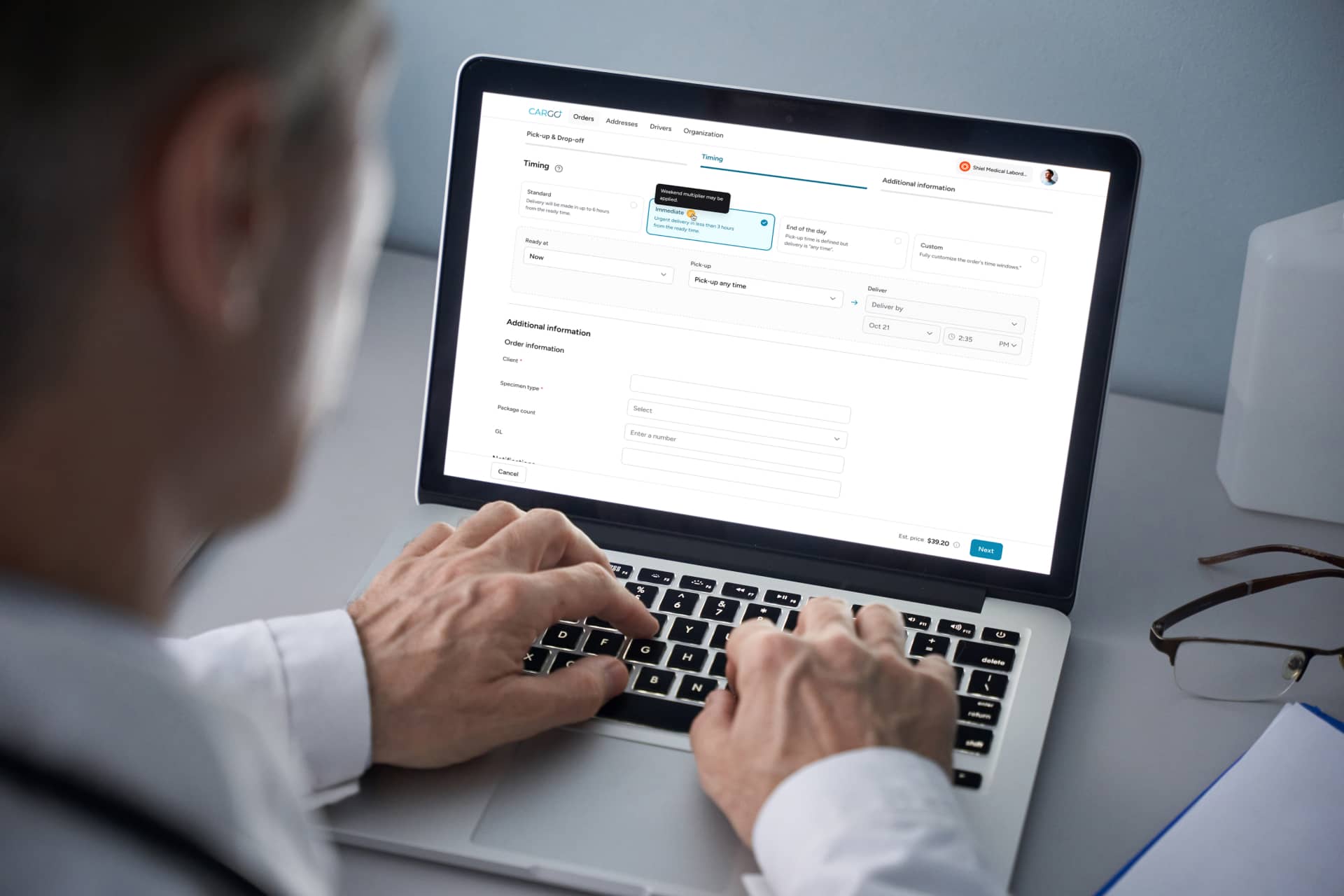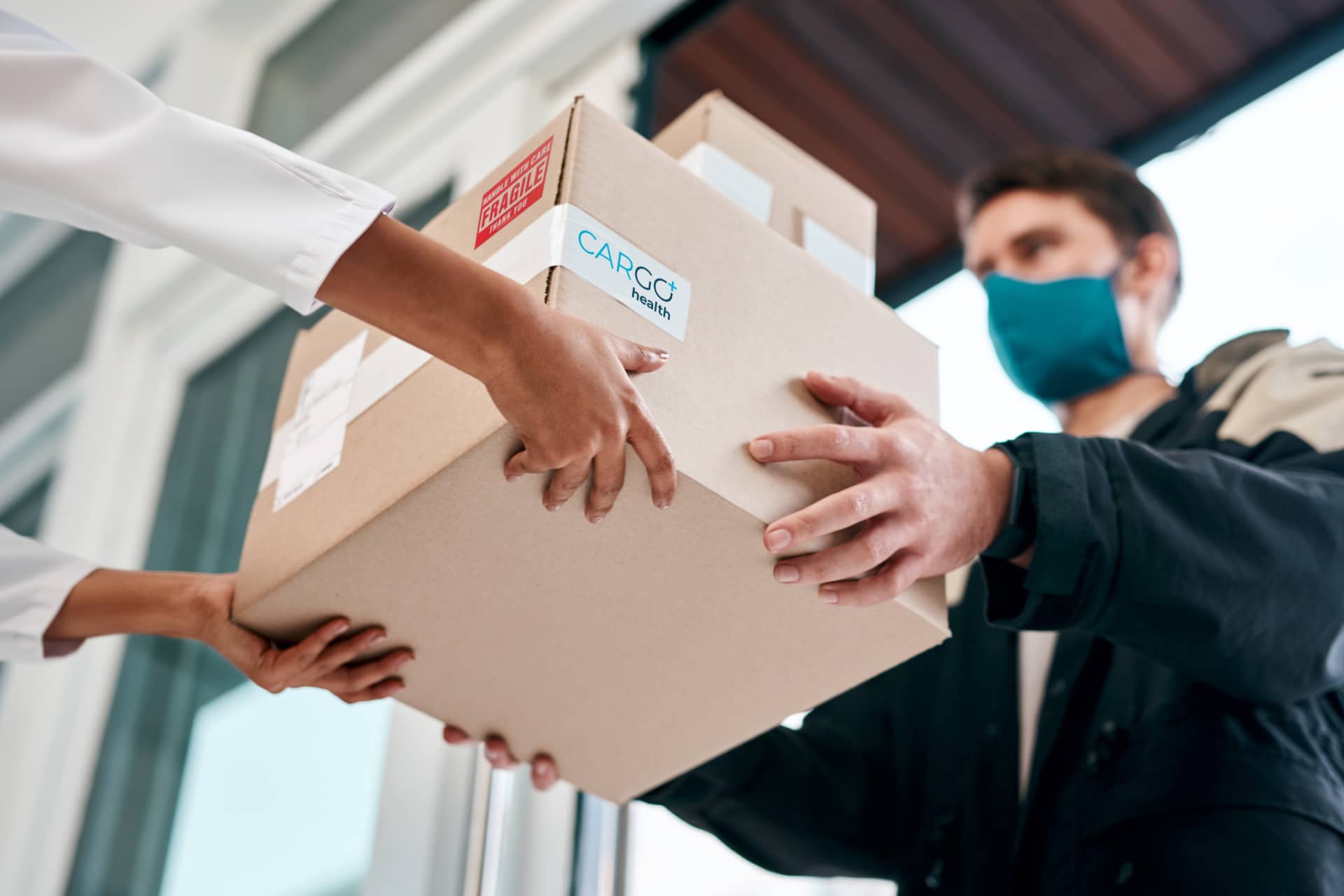The Importance of Training and Certification in Medical Courier Services

Introduction
Background of Medical Courier Services
Medical courier services play a pivotal role in the healthcare industry by ensuring the timely and safe delivery of medical specimens, equipment, documents, and other critical healthcare materials. The specialized nature of these deliveries demands a high level of expertise, knowledge, and adherence to regulatory standards to ensure the integrity and safety of the medical materials being transported.
The dynamics of healthcare logistics have evolved over the years, with medical couriers now being integral components in the healthcare supply chain. Their role extends beyond mere transportation to ensuring compliance with healthcare standards, understanding the criticality of the materials they handle, and acting swiftly in emergency situations.
The Critical Role of Medical Couriers in Healthcare
Medical couriers act as the lifeline between different healthcare facilities, laboratories, and sometimes directly with patients. They are responsible for the safe and timely delivery of medical specimens which could be crucial for diagnosis and treatment. The significance of their role is particularly highlighted in emergency situations where timely delivery can be a matter of life and death.
The responsibilities of medical couriers extend to maintaining the integrity of the specimens or equipment they handle. This includes ensuring the right temperature control, handling protocols, and ensuring no cross-contamination occurs during transit.
The Need for Specialized Training and Certification
Given the critical nature of their job, medical couriers require specialized training and certification to ensure they are equipped with the necessary knowledge and skills. This training encompasses a range of areas including handling biohazardous materials, understanding regulatory compliance, and mastering the technologies used in tracking and monitoring deliveries.
Certification serves as a testament to the competency and professionalism of medical couriers, ensuring they are up to date with the latest industry standards and practices. It also provides a framework for accountability and continuous improvement, fostering a culture of excellence and adherence to the highest standards of service delivery.

Regulatory Landscape
Overview of National and International Regulations
The regulatory landscape governing medical courier services is extensive, encompassing both national and international standards. These regulations are aimed at ensuring the safety, security, and integrity of medical materials during transit. Compliance with these regulations is not only a legal requirement but also a moral obligation to ensure the well-being of patients and healthcare providers.
Regulations cover a broad spectrum of areas including packaging, labeling, transportation, and delivery of medical materials. They also stipulate the requirements for training and certification of medical couriers to ensure competency and adherence to the highest standards of service delivery.
Compliance with Health Insurance Portability and Accountability Act (HIPAA)
Compliance with HIPAA is paramount in maintaining the privacy and security of patient information during transit. Medical couriers must be trained to understand the implications of HIPAA, especially when transporting medical records and other sensitive patient information. The training should cover the legal and ethical obligations under HIPAA, as well as the technical and administrative safeguards necessary to ensure compliance.
Ensuring HIPAA compliance in every aspect of the courier service not only maintains the integrity and confidentiality of patient information but also mitigates the risk of legal repercussions that could arise from non-compliance.
Compliance with Occupational Safety and Health Administration (OSHA) Standards
Adherence to OSHA standards is crucial in ensuring the safety and well-being of medical couriers and other stakeholders. Training programs should cover the OSHA guidelines on handling and transporting hazardous materials, emergency response procedures, and other relevant safety protocols.
Compliance with OSHA standards also extends to ensuring a safe working environment for medical couriers, including the provision of necessary protective equipment and adherence to ergonomic guidelines to prevent workplace injuries.
Other Relevant Regulatory Bodies and Standards
Apart from HIPAA and OSHA, there are other regulatory bodies and standards that medical couriers need to comply with. These may include state and local health department regulations, Department of Transportation (DOT) regulations, and international standards such as the International Air Transport Association (IATA) guidelines for shipping dangerous goods.
Staying abreast of the evolving regulatory landscape and ensuring compliance with all relevant regulations is a continuous process that requires a robust training and certification program for medical couriers.
Training Programs
Core Competencies for Medical Couriers
The core competencies required for medical couriers encompass a wide range of skills and knowledge areas. These include handling and transportation of medical specimens, understanding biohazard and safety procedures, knowledge of temperature control and monitoring, as well as emergency procedures and protocols.
Developing a structured training program that covers these core competencies is crucial in ensuring the readiness and competency of medical couriers. Continuous assessment and refresher training are also vital in maintaining a high level of service quality and compliance.
Specialized Training Areas
Specialized training areas may include radioactive material transportation, infectious substance transportation, and handling and transportation of organ transplants. These specialized areas require advanced knowledge and skills, as well as a thorough understanding of the associated risks and compliance requirements.
Providing specialized training enables medical couriers to handle complex and sensitive medical deliveries with a high level of expertise and professionalism, thereby enhancing the overall service quality and reliability.

On-going Training and Skill Upgradation
The medical courier industry is dynamic with evolving regulations, technologies, and best practices. On-going training and skill upgradation are essential in ensuring that medical couriers remain competent and updated on the latest industry developments.
Establishing a culture of continuous learning and development is crucial in fostering a highly skilled and motivated workforce capable of delivering exceptional service quality and adhering to the highest standards of compliance and professionalism.
Certification Process
Importance of Certification
Professional certification in the medical courier industry is a significant marker of competency, adherence to industry standards, and a commitment to continuous professional development. It provides a structured framework for evaluating and validating the skills and knowledge of medical couriers, ensuring they meet the stringent requirements of the healthcare logistics sector.
Certification also plays a critical role in liability and risk management. Certified medical couriers are better equipped to handle the complexities and potential hazards associated with medical deliveries, thereby reducing the risks of errors, accidents, and legal liabilities.
Certification Bodies and Accreditation
Various reputable bodies offer certification programs for medical couriers. These bodies often provide a comprehensive curriculum covering the essential aspects of medical courier services, including regulatory compliance, safety protocols, and specialized handling procedures.
Accreditation from recognized bodies provides an added layer of credibility and assurance of the quality and rigor of the certification program. It’s crucial to choose certification programs accredited by reputable organizations to ensure the highest standards of training and assessment.
Process of Obtaining Certification
The process of obtaining certification typically involves a combination of formal education, practical training, and assessment. Candidates may be required to complete a certain number of training hours, pass written and practical exams, and demonstrate competency in real-world scenarios.
Maintaining certification often requires ongoing education and re-assessment at regular intervals. This ensures that certified medical couriers continue to meet the evolving standards of the industry and stay updated on the latest best practices and regulations.
Maintaining and Renewing Certification
To ensure continued compliance and competency, medical couriers must adhere to the maintenance and renewal requirements of their certification. This often involves completing continuing education units (CEUs), undergoing refresher training, and passing re-certification exams.
The process of maintaining and renewing certification reinforces the importance of continuous learning and adherence to the highest standards of professionalism and service delivery in the medical courier industry.
Technological Advancements
Use of Technology in Training and Certification
Technology plays a vital role in enhancing the effectiveness and accessibility of training and certification programs. E-learning platforms, virtual reality (VR) simulations, and mobile applications are some of the technological tools that can be leveraged to provide flexible and interactive training experiences.
Moreover, technology facilitates the assessment and tracking of training progress, enabling a more personalized and data-driven approach to learning and development.
Technological Tools for Enhancing Service Delivery
Advanced tracking and monitoring systems, temperature-controlled transportation equipment, and automated dispatching and routing software are some of the technological tools that significantly enhance service delivery in the medical courier industry.
These tools not only improve operational efficiency but also ensure a higher level of compliance with safety and quality standards, thereby significantly reducing the risks associated with medical deliveries.
The Role of Data and Analytics in Continuous Improvement
Data analytics provides valuable insights into the performance, efficiency, and compliance of medical courier operations. By analyzing data on delivery times, route efficiency, and compliance incidents, medical courier companies can identify areas for improvement and optimize their operations.
Furthermore, data analytics can be used to monitor and evaluate the effectiveness of training and certification programs, providing a feedback loop for continuous improvement and adaptation to the evolving needs of the industry.
Benefits and Impact
Enhanced Service Quality
Training and certification significantly contribute to enhanced service quality in the medical courier industry. By ensuring that couriers are well-versed in the best practices and regulatory requirements of medical logistics, the likelihood of errors, delays, and non-compliance incidents is substantially reduced. This, in turn, leads to improved satisfaction among healthcare providers and patients who rely on timely and accurate deliveries.
Moreover, a well-trained and certified workforce can adeptly handle the diverse and often complex needs of medical deliveries, ensuring that the integrity and safety of medical materials are maintained throughout the transit process.
Improved Safety and Compliance
Safety and compliance are paramount in the medical courier sector. Training and certification programs provide the necessary education and skill development to ensure that couriers can accurately identify and mitigate risks associated with the transportation of medical materials. This includes understanding and adhering to biohazard handling procedures, temperature control requirements, and emergency response protocols.
Additionally, certification acts as a benchmark for compliance, signaling to healthcare providers and regulatory authorities that the courier service operates according to the highest industry standards.
Increased Trust and Reliability among Stakeholders
Trust and reliability are crucial for building and maintaining strong relationships with stakeholders in the healthcare sector. Training and certification contribute to a culture of professionalism and competency, which in turn fosters trust among healthcare providers, patients, and regulatory authorities.
Furthermore, certification provides a verifiable credential that stakeholders can rely on when evaluating the competency and reliability of medical courier services, thereby enhancing the reputation and credibility of certified courier companies in the market.
Competitive Advantage in the Market
In a competitive market, training and certification provide a significant advantage by showcasing a courier service’s commitment to excellence, safety, and compliance. Certified medical courier companies are often preferred by healthcare providers due to the assurance of quality and reliability that certification entails.
Moreover, a well-trained and certified workforce can contribute to operational efficiency and cost-effectiveness, further enhancing the competitive edge of medical courier companies.

Case Studies
Examination of Medical Courier Services with Robust Training and Certification Programs
An in-depth examination of medical courier companies with robust training and certification programs reveals a correlation between such programs and enhanced service quality, safety, and stakeholder satisfaction. These case studies provide practical insights into the implementation of training and certification programs and the tangible benefits derived from such initiatives.
The case studies also offer a platform for sharing best practices, lessons learned, and strategies for overcoming challenges associated with training and certification in the medical courier sector.
Analysis of Incident Reports and the Role of Training and Certification
A thorough analysis of incident reports within the medical courier sector can shed light on the role of training and certification in preventing and mitigating adverse events. This analysis can provide valuable data on the common causes of incidents and the effectiveness of training and certification programs in addressing these issues.
Moreover, examining incident reports can help identify areas for improvement in training and certification curricula, thereby contributing to the continuous improvement and adaptation of these programs to the evolving needs of the industry.
Future Trends
Anticipated Changes in Regulatory Framework
The regulatory landscape governing medical courier services is expected to evolve in response to technological advancements, emerging threats, and the global nature of healthcare logistics. Anticipated changes may include stricter regulations on data privacy, biosecurity, and cross-border transportation of medical materials. Staying ahead of these regulatory changes will require medical couriers to engage in continuous education and certification programs to ensure compliance.
Moreover, international harmonization of regulations might gain traction to facilitate global medical logistics, necessitating medical couriers to have a broader understanding of international standards and compliance requirements.
Evolving Training and Certification Models
The models for training and certification are likely to evolve with the integration of advanced technologies like artificial intelligence (AI), virtual reality (VR), and blockchain. These technologies can enhance the delivery, assessment, and verification of training and certification programs, making them more interactive, efficient, and credible.
Furthermore, the emergence of micro-credentials and digital badges may provide more flexible and modular approaches to certification, allowing medical couriers to continuously update their skills and credentials in response to the evolving industry needs.
Integration of Advanced Technologies
The integration of advanced technologies such as real-time tracking, predictive analytics, and autonomous delivery systems is set to revolutionize the medical courier industry. These technologies will require couriers to have a new set of skills and knowledge, necessitating updated training and certification programs.
Moreover, technology will enable more robust monitoring and evaluation of courier performance and compliance, facilitating continuous improvement and higher standards of service delivery.
Conclusion
Recapitulation of Key Points
The article has delved into the imperative of training and certification in the medical courier sector, underlining the regulatory landscape, core competencies, technological advancements, and the tangible benefits derived from robust training and certification programs. The evolving nature of the medical courier sector necessitates a commitment to continuous education, certification, and adaptation to ensure the highest standards of service delivery, safety, and compliance.
The insights gleaned from case studies and incident report analysis further underscore the critical role of training and certification in enhancing the professionalism, reliability, and competitive advantage of medical courier services.
Call to Action for Strengthening Training and Certification in the Industry
As the medical courier industry continues to evolve, stakeholders must invest in robust training and certification programs to ensure a well-equipped, competent, and compliant workforce. Collaborative efforts among courier companies, certification bodies, regulatory authorities, and technology providers will be instrumental in advancing the industry standards and preparing medical couriers to meet the challenges and opportunities of the future.
Harnessing Excellence through Training and Certification at carGO Health
As we’ve explored throughout this article, the role of medical couriers is integral to the seamless operation of healthcare services, with training and certification playing a crucial role in ensuring the reliability and efficiency of deliveries. carGO Health stands as a paradigm of excellence in this domain, embodying the principles and practices that underpin the successful delivery of medical supplies, specimens, and critical healthcare equipment.

carGO Health: Elevating Standards in Medical Courier Services
At carGO Health, we pride ourselves on our unwavering commitment to quality, safety, and precision in every delivery we undertake. We understand that in the realm of healthcare, there is no margin for error. That’s why our team of medical couriers undergoes rigorous training and certification processes, ensuring they are equipped with the knowledge, skills, and expertise to handle the unique challenges of medical logistics.
Our comprehensive training program encompasses a wide array of crucial topics, including biohazard handling, temperature control protocols, secure transportation practices, and an in-depth understanding of healthcare regulations. This extensive training ensures that our couriers are not just drivers, but highly skilled professionals who play a critical role in the healthcare supply chain.
Transparency and Trust: The carGO Health Guarantee
At carGO Health, transparency is at the core of our operations. With our state-of-the-art tracking technology, clients have real-time access to the status of their deliveries, providing peace of mind and ensuring accountability throughout the transportation process. Our commitment to transparency extends to our training and certification programs, with all our medical couriers required to meet stringent standards of excellence.
A Partner You Can Rely On
Choosing carGO Health as your medical courier partner means choosing reliability, precision, and peace of mind. We serve a diverse range of healthcare institutions, from hospitals and laboratories to pharmacies and clinics, ensuring that every delivery, no matter how critical, is handled with the utmost care and professionalism.
Your Health, Our Priority
At carGO Health, we are more than just a courier service; we are an integral part of the healthcare system. We understand that behind every delivery, there is a patient awaiting crucial medical attention. This understanding drives us to strive for excellence in every aspect of our operations, ensuring that we contribute positively to patient outcomes and the efficiency of healthcare delivery.
Join Us on the Journey to Excellence
As we navigate the ever-evolving landscape of healthcare logistics, we invite you to join us on this journey to excellence. Choose carGO Health for your medical courier needs and experience the difference that a trained, certified, and dedicated team can make. Together, we can ensure that healthcare materials reach their destinations safely, securely, and promptly, every time.
Experience the carGO Health Difference Today
Ready to elevate your medical logistics experience? Contact carGO Health today, and discover how our trained and certified medical couriers can provide unparalleled service and peace of mind for all your healthcare delivery needs. Let’s work together to ensure that every delivery is a step towards improved patient care and a more efficient healthcare system. Get in touch with us now and experience the carGO Health difference today!








